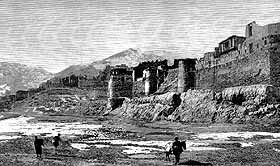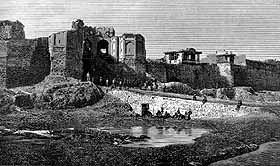| The full text of The Graphic article published in London with early news of the British defeat at Maiwand: |
| "THE AFGHAN DISASTER - Later and fuller details of the conflict at Khushk-i-Nakhud have somewhat modified the impression made by the terrible word "annihilation," which was by many persons not unnaturally interpreted almost in its literal sense. We now know that there was a hotly contested fight lasting over several hours, and that, lamentable as the losses were, half the defeated brigade reached Candahar. |
| "Still the destruction of life was almost unprecedentedly heavy, judging by the records of modern warfare, for this fight was quite unlike Isandlwhana, where a small body of Europeans, unprovided with the usual South African laager, were literally overwhelmed by a multitudinous horde of savages. At Khushk-i-Nakhud General Burrows, rashly, as the event proved, offered battle, quitting a defensive position for that purpose. The result of the action showed that both in men and guns he was overmatched, but, even if he was correctly informed of the strength of Ayoob Khan's force, he may not have considered himself overmatched. Remembering the records of Indian battles, a General with 2,400 men, a large proportion of whom were Europeans, may have considered himself on part with a purely Asiatic enemy five times as numerous. |
| "According to present accounts, which, however, may possibly be modified hereafter, the Bombay Sepoys were unable to withstand the impetuous charge of the Ghazis, and thus threw the 66th into hopeless confusion. The defeat gradually became a rout, but it would seem that our unfortunate fellows did not fall so much beneath the swords of the pursuing foe as from the effect of thirst and fatigue. Some of the missing may, perhaps, have since come in, but it is more likely that those who sank from exhaustion were murdered by the surrounding villagers, and it is well know that the Afghans do not make prisoners. |
| "The miseries of that flight to Candahar, when many of the fugitives, at the hottest season of the year, went for four-and-twenty hours without a drop of water, will probably long be remembered. The most satisfactory feature of this disastrous business at present seems to be that Ayoob Khan either could not or would not follow up his success. If he had shown some of the vigor and promptitude of a really great general, he might have seriously imperilled our hold of the country. It is to be hoped that by this time reinforcements have poured in, and that Ayoob has lost his opportunity without hope of recovering it." |
 Further Reading Further Reading |



